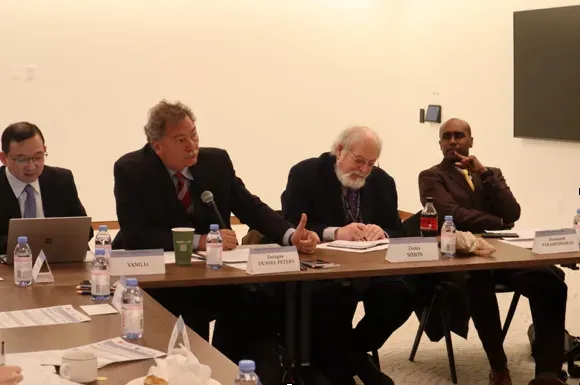6th “U.S.-China Plus” Roundtable
Hosted by Institute for China-America Studies; co-hosted with The Carter Center, National Institute for South China Sea Studies, Beijing Club for International Dialogue, Institute for China-Europe Studies (ICES)

Speakers speaking at Panel 1, 6th “U.S.-China Plus” Roundtable (Image Source: Institute for China-America Studies)
On December 13, 2024, the 6th “U.S.-China Plus” Roundtable was held at the Institute for China-America Studies in Washington, D.C. First launched in 2019 as the “China-U.S.-Canada” Trilateral Roundtable, the forum has since expanded to include a wider range of international voices. This year’s event brought together 20 speakers across sectors to generate innovative and pragmatic policy ideas aimed at strengthening peace, stability, and cooperation between the United States and China.
The event featured three panel discussions:
Director Yang’s Remark:
During Panel I, Mr. YANG Li, Executive Director of ICES, offered insights on how Europe is navigating
the economic fallout of U.S.-China derisking. He noted that the European Union's derisking efforts
have focused on reducing overreliance on Chinese supply chains - particularly in critical industries
such as electric vehicles - while aiming to maintain resilience. Mr. Yang expressed concern that
U.S. derisking could cause unintended spillover effects, including a surge in diverted Chinese
exports to Europe, potentially unsettling EU markets and trade balances. He highlighted European
anxieties over a possible return of coercive U.S. trade policies, such as tariffs on European goods,
under a new U.S. administration. He also touched on the broader strategic landscape, emphasizing
that leadership transitions in the U.S. have fueled uncertainty in Europe regarding transatlantic
alignment. In addition, the Ukraine conflict and European perceptions of China’s position on Russia
have further strained trust between China and the EU, contributing to a more hawkish European posture
in its China policy.